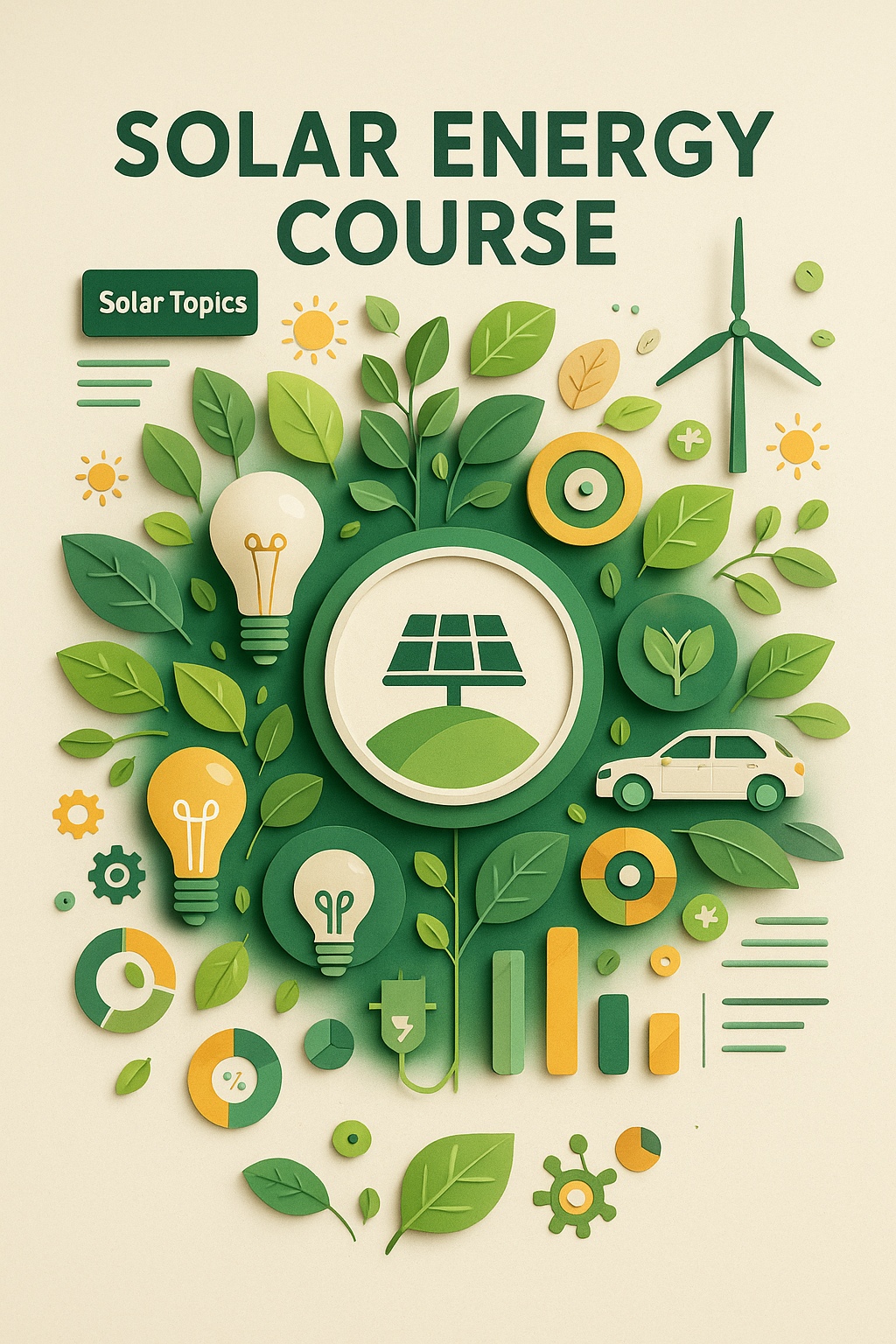
About Course
🌞 Course Title: Renewable Energy Systems (Solar Energy)
Code: 28003EL-TECH
Duration: 4 Weeks (12 Hours – 3 hours/week)
Level: Intermediate
📜 Introduction
This course introduces participants to the principles and applications of solar energy, focusing on the design, installation, and maintenance of solar energy systems for residential use. It provides both theoretical knowledge and practical skills required for understanding the components of solar systems and integrating them into homes for sustainable energy solutions.
📝 Course Description
The Renewable Energy Systems (Solar Energy) course offers a deep dive into solar energy, focusing on key components such as solar panels, batteries, inverters, and the overall solar system architecture. Participants will gain hands-on experience in designing, installing, and maintaining solar systems. The course also addresses important safety protocols and how to troubleshoot common issues in solar power installations.
By the end of the course, participants will be equipped to design solar systems for households, perform basic troubleshooting, and ensure systems are operating efficiently.
🎯 General Course Objectives
By the end of this course, participants will:
-
Understand the fundamentals of solar energy and its role in the renewable energy landscape.
-
Learn about the key components of solar energy systems.
-
Gain practical skills in installing, maintaining, and troubleshooting home solar power systems.
📑 Detailed Weekly Outlines
📘 Week 1: Introduction to Renewable Energy (3 Hours)
Objectives:
-
Gain knowledge about the importance of renewable energy in the global context.
-
Learn about different types of renewable energy sources and their specific advantages and challenges.
Content:
-
Importance and benefits of renewable energy for sustainable development.
-
Types of renewable energy sources:
-
Solar Energy
-
Wind Energy
-
Hydro Energy
-
-
Advantages and disadvantages of solar energy as a renewable resource.
-
Environmental impact of solar energy compared to fossil fuels.
Outcomes:
-
Understanding of the global energy crisis and the transition to renewable sources.
-
Ability to compare solar energy with other renewable resources and fossil fuels.
📘 Week 2: Components of Solar Energy Systems (3 Hours)
Objectives:
-
Understand the key components that make up a solar energy system.
-
Learn how each component contributes to the overall functionality of the system.
Content:
-
Solar Panels:
-
Types of solar panels: Monocrystalline, Polycrystalline, and Thin-Film.
-
Efficiency and performance considerations.
-
-
Solar Batteries and Storage Systems:
-
Types of batteries used for energy storage (Lead-acid, Lithium-ion).
-
Battery efficiency and life cycle.
-
-
Inverters:
-
The role of inverters in converting DC to AC power.
-
Types of inverters: string inverters, microinverters, and hybrid inverters.
-
Outcomes:
-
Ability to identify and differentiate between the different types of solar panels and storage systems.
-
Understanding the function of inverters and how they contribute to a solar power system.
📘 Week 3: Designing and Installing Solar Energy Systems (3 Hours)
Objectives:
-
Learn how to assess and design solar systems for homes or small businesses.
-
Gain practical knowledge in the installation process.
Content:
-
Estimating Household Energy Needs:
-
Calculating the power requirements for lighting, appliances, and heating.
-
-
Designing the Solar System:
-
Matching solar panel capacity with energy consumption.
-
Selecting battery storage capacity.
-
-
Installation of Solar Panels:
-
Proper placement and mounting of solar panels.
-
Wiring connections to an inverter and grid.
-
Outcomes:
-
Ability to calculate energy needs and design a solar energy system tailored to those needs.
-
Hands-on knowledge of the solar panel installation process.
📘 Week 4: Maintenance and Safety of Solar Systems (3 Hours)
Objectives:
-
Learn how to maintain and troubleshoot solar energy systems.
-
Understand safety practices in solar energy system installation and maintenance.
Content:
-
Solar Panel and Battery Maintenance:
-
Cleaning and maintaining solar panels for optimal performance.
-
Checking and maintaining batteries.
-
-
Fault Detection and Troubleshooting:
-
Identifying common issues in solar systems (e.g., panel failures, battery issues).
-
Diagnosing and fixing problems in solar installations.
-
-
Safety Protocols:
-
Understanding the electrical safety standards.
-
Precautionary measures during installation and maintenance.
-
Outcomes:
-
Practical skills in performing routine maintenance and troubleshooting on solar energy systems.
-
Confidence in following safety guidelines while working with electrical solar installations.
🎓 Final Learning Outcomes Summary
By the end of the course, participants will be able to:
-
Design and install residential solar energy systems.
-
Maintain and troubleshoot solar panels, batteries, and inverters.
-
Ensure safe practices during solar installations and maintenance.
-
Apply renewable energy knowledge to contribute to sustainable energy solutions.
By the end of this course, you will be able to:
Design and size a solar power system for residential use.
Install and connect solar panels, batteries, and inverters.
Perform troubleshooting to identify and fix issues with solar systems.
Understand and follow safety procedures for working with solar energy systems.
Maintain and extend the lifespan of solar energy systems through proper care and preventive measures.
Course Content
Student Ratings & Reviews



